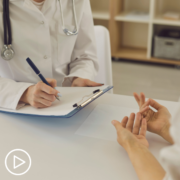What Are the Current CLL Treatment Options?
What Are the Current CLL Treatment Options? from Patient Empowerment Network on Vimeo.
When is it time to treat CLL, and what are the current options? Dr. Jean Koff, from the Winship Cancer Institute of Emory University, reviews available CLL treatment approaches and discusses patient-specific factors that she considers when choosing therapy.
Dr. Jean Koff is an Assistant Professor in the Department of Hematology and Oncology at Winship Cancer Institute of Emory University. Learn more about Dr. Koff, here.
Related Resources:

|

|

|
Transcript:
Katherine Banwell:
Many patients are overwhelmed by the different types and classes of treatment. When is it time to treat CLL, and what are the options?
Dr. Jean Koff:
So, I boil down the criteria to when you need to treat your CLL to two main categories. One category is that the disease is progressing quickly, and the other category is the disease is causing problems of some kind, or getting ready to cause problems of some kind. Those are some of the broad categories that we think about when it’s time to start treatment for CLL. Now, this – the groups that research CLL have put out various criteria that help guide physicians about when it’s time to start treatment, and some of those more specific criteria include items like symptoms. So, symptoms are a very important part of that decision-making process.
And the same symptoms that we mentioned, the B symptoms, fevers, chills, night sweats, weight loss that’s unintentional, or lymph nodes that you can feel, those would potentially be reasons that your doctor would want to start you on CLL therapy. But the CLL can cause issues even in a patient who’s not necessarily having symptoms. So, one of the most common ways that CLL can cause issues is the CLL cells can cause your other blood cells, the normal blood cells, to be low in number. There are several ways the CLL cells can do this. One of the most common ways is that the CLL cells, which are often circulating through your bloodstream, can also collect or overrun your bone marrow.
And if you think about it, the bone marrow is the factory that makes all of your blood cells. So, when there are too many CLL cells in the bone marrow, they can crowd out the normal blood cells, like red blood cells or platelets. So, when red blood cells or platelets get low beneath certain thresholds, that’s a reason to start CLL therapy.
Katherine Banwell:
Mm-hmm.
Dr. Jean Koff:
So, there are a couple other criteria that we think about. CLL cells can collect in other areas, including the spleen. So – and if you remember, the spleen is a lymphoid organ that sits on the left side of your body that is right below the stomach. And so, if CLL cells collect in the spleen, they can cause it to be too big, it can press on the stomach, it can make it so you feel full, even if you haven’t eaten a full meal, that’s something we call early satiety. It can be uncomfortable, causing some abdominal pain. And if the spleen gets really, really big, it can cause it to not be able to do its normal job, which is to filter out the normal blood cells like it does every day. And so, that would be a reason to start therapy as well. And then the last – the last category I would think about is in CLL we have lots of – of CLL cells that are circulating in the blood that we can check with a routine blood count. And the absolute number of CLL cells is not as important as how fast that number is growing. So, your physician will track how fast that number of CLL cells is doubling.
And if you meet criteria for what we call rapid doubling time, which is usually thought of as less than 12 months but certainly less than six months. So, if your count goes from 30,000 to 60,000 in under six months, then it may be time for you to start thinking about therapy.
Katherine Banwell:
Right. So, Dr. Koff, would you briefly review the treatment classes?
Dr. Jean Koff:
So, for first-line treatment, we have two main treatment classes that we think about at this time. The first is – is called BTK inhibitors, which is Bruton tyrosine kinase inhibitors. And these are oral medications, so medications that you take by mouth, and the most well-studied of these is called ibrutinib (Imbruvica), we typically prescribe ibrutinib by itself. There are other BTK inhibitors we are also now using in this space, one of them is called acalabrutinib (Calquence), and that is often given with an IV monoclonal antibody called obinutuzumab (Gazyva).
The other main class of drugs that we consider for first-line treatment of CLL is the BCL-2 inhibitors. Right now there’s only one BCL-2 inhibitor that’s approved for CLL and front-line and it’s called venetoclax (Venclexta). Usually, this drug is also given in the front-line with an anti-CD20 monoclonal antibody. So, the venetoclax itself is a pill you take. And the monoclonal antibody is an – either an IV or a subcutaneous injection.
Katherine Banwell:
Where do clinical trials fit into CLL treatment?
Dr. Jean Koff:
So, clinical trials are part of the reason, a big part of the reason that we’ve been able to make so much progress in how we treat CLL over the past few years. Clinical trials are how we figure out what treatments work for CLL, how patients feel on them, what sort of adverse events or side effects they have on individual treatments, and which treatments do better for keeping CLL symptoms under control, keeping the disease under control, and allowing patients to live longer and have a higher quality of life with their disease.
Katherine Banwell:
Are there any other options available for CLL patients?
Dr. Jean Koff:
So, there are other options. A clinical trial, if that is available to you as a patient is nearly always a good thing to consider if you have CLL. Because the vast majority of patients will not be cured by CL – by their treatment for CLL. Meaning that the – even though the treatments we have usually work for a very long time in most patients, ultimately the CLL will at some point, perhaps years down the road, progress and need another therapy. For that reason, we know we can do better. And we are hoping that the next clinical trial is going to lead to the discovery of a new agent or a new combination – new combinations of agents that will allow patients to live longer with a better quality of life with CLL.
Katherine Banwell:
Mm-hmm.
Dr. Jean Koff:
So, that’s always a good option to consider.




